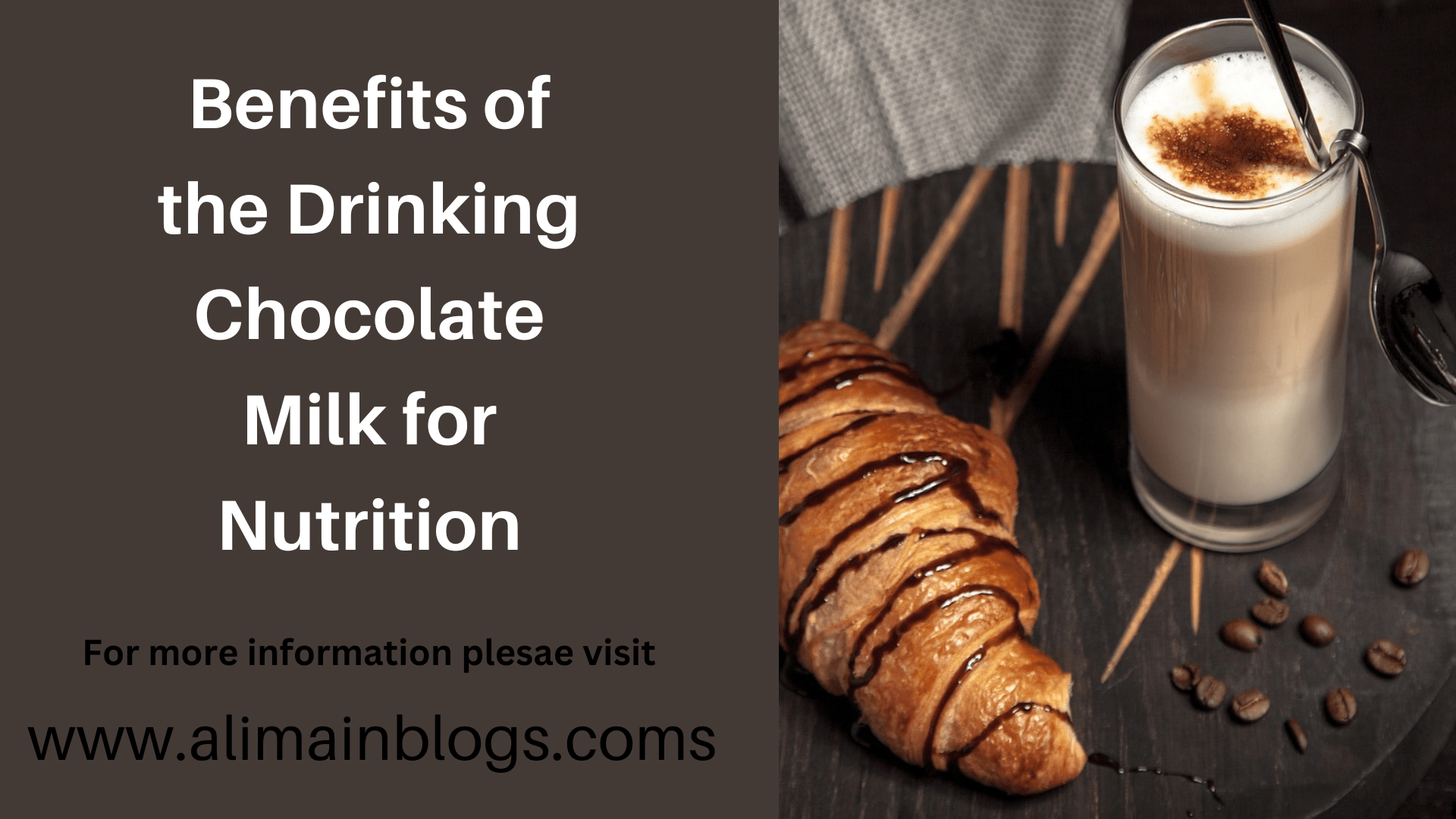Benefits of the Drinking Chocolate Milk for Nutrition. Typically, people associate chocolate milk with young children. But it’s also popular among adults for its flavour and comforting qualities. You might be wondering if your childhood favourite. Chocolate milk, has any health advantages as you prepare to sip on it. Here’s the skinny on the ingredients in the beverage and what the science says about how drinking chocolate milk might affect your health.
Milk Chocolate Nutrition
Chocolate milk is offered in whole (3.5% fat by weight), 2%, 1%, and skim versions, much as unsweetened, unflavored milk. (1% chocolate milk is frequently offered in single-serve cups.)
It has 150 calories, 2.5 grammes of fat, 23 grammes of carbohydrates (with around 10 grammes of added sugar), and 8 grammes of protein per 8-ounce container of Organic Valley’s 1% chocolate milk. Additionally, same serving has 20% of the recommended daily intake for calcium, 30% for the B vitamin riboflavin, 10% for potassium, and 15% each for vitamins A and D. In conclusion, while chocolate milk does include some essential nutrients, it also provides a third of the daily added sugar allowance for women as suggested by the American Heart Association. Each 8-ounce cup of low-fat (1%) chocolate milk contains 7.4 ounces of water, which helps with hydration, according to the USDA database.
Is drinking homemade chocolate milk any better or worse than consuming pre-made chocolate milk if you use chocolate syrup? Possibly not, but it depends on how little or how much syrup you add. The amount of added sugar in one tablespoon of Hershey’s chocolate syrup. When mixed with eight ounces of milk, is exactly the same as the amount in eight ounces of pre-sweetened chocolate milk: ten grammes.
The effects of chocolate milk on health

Benefits of the Drinking Chocolate Milk for Nutrition. There is a dearth of evidence on the relationship between chocolate milk and adult health consequences. Instead, results are based on research on milk itself, not chocolate milk, and those results are conflicting.
For instance, a 2018 British Medical Journal (BMJ) study showed no proof of a protective relationship between a prolonged intake of calcium from dairy sources and fracture risk. According to a 2014 BMJ study, consuming more milk did not reduce. The incidence of fracture and might even increase mortality in adults.
The consumption of dairy products, on the other hand, was not linked to an increased risk of all-cause death, according to a 2019 review of eight earlier studies that was published in the journal Advances in Nutrition. (Note: The Interprofessional Dairy Organization of Spain financed the study.) Additionally, a 2021 review of 41 research in Nutrition & Metabolism revealed. That while milk consumption was linked to both health benefits and dangers, the findings skewed more favourably than unfavourably.
The outcomes of these research generally reflect the consequences of routine (and frequently excessive) milk consumption, which is an important point to remember. Many people occasionally sip on chocolate milk. In other words, drinking one or more glasses of chocolate milk every day will have a greater impact on bone health and mortality than drinking a glass of it once a week.
Recovery after exercise and chocolate milk

Many people associate chocolate milk with sweet treats, but it has also been recommended as a post-workout recovery beverage. Many references on the subject refer to a 2006 study published. The International Journal of Sport Nutrition and Exercise Metabolism. In that study, interval training, a four-hour break, and then more cycling till exhaustion were required of nine men endurance-trained cyclists on three different days. The cyclists chose from three drinks: chocolate milk. A reduced carb fluid replacement with electrolytes. A higher carb drink with the same number of carbs as the chocolate milk, after their initial training session and again two hours later. Researchers discovered that athletes who drank chocolate milk took longer to tyre themselves.
Clinical Nutrition
In contrast to water chocolate milk was compared in a 2018 study published in the European Journal of Clinical Nutrition as a recovery aid after all-out sessions of high-intensity endurance climbing. Ten men spent their entire day scaling a climbing wall. The participants drank either water or chocolate milk for 20 minutes. Then drank their respective beverages once more with their evening meals. The routine was likewise carried out by the athletes utilising the substitute beverage. The men increased both the length of the workout and the distance climbed when they drank chocolate milk. Three days after activity, the scores for muscle pain were similarly lower in the chocolate milk drinkers. Benefits of the Drinking Chocolate Milk for Nutrition.
While the research is intriguing. It’s crucial to keep in mind that it examined beverages with quite different chemical compositions. Including those that aren’t advised for use in recovery. A post-workout snack or beverage should replenish hydration and nutrients lost during exercise and offer the body the building blocks it needs to repair from the damage exercise causes.
In addition to both carbs and protein in a 4:1 ratio. Sports nutritionists have long advised athletes and active people to take hydration, electrolytes, and other nutrients after a rigorous workout. In other words, the drinks compared to chocolate milk in these studies—water. A sports drink, or a carb-only beverage—aren’t part of the recommended diet after a strenuous activity.
Researchers evaluated post-exercise recovery markers in 12 earlier studies. That compared chocolate milk to either water or sports drinks for a 2017 analysis. That was publishe in the European Journal of Clinical Nutrition. The researchers came to the conclusion that chocolate milk might be an effective recovery aid since it provides nutrients essential for refuelling and repairing. But once more the study contrasted chocolate milk with other beverages. That aren’t advised as a stand-alone means of recovering from intense activity.
Main benefit of chocolate milk
The main benefit of chocolate milk is that it naturally contains the fluids. Macronutrients and micronutrients required to help exercise recovery. Leucine, an amino acid required to start the synthesis of muscle protein, is also present in large quantities in cow’s milk. And chocolate milk is generally accessible and reasonably priced. Nevertheless, it is not the only alternative, and for certain people, such as those who have a milk allergy or sensitivity, those who are lactose intolerant, and vegans, it is also not an option at all.
There are several options if dairy-based chocolate milk isn’t a good choice for you for whatever reason. If you simply don’t want to drink it. One is split-pea-base chocolate plant milk. Like chocolate milk made from dairy. Chocolate pea milk has 8 grammes of protein and is a good source of leucine per cup. In addition an 8-ounce serving of the plant-based milk with the Ripple chocolate flavour has 4.5 grammes of fat, 17 grammes of carbohydrates with 15 grammes of added sugar, 35% of the daily value for calcium, 100% of the daily value for vitamin B12, 10% of the daily value for potassium, 10% of the daily value for vitamin A, and 30% of the daily value for vitamin D. To increase the recommended carb-to-protein ratio to 4:1, combine pea milk with a small banana.
Summary
If you occasionally choose chocolate milk as a treat, it might offer more nutrients than anything else sweet like ice cream or a brownie. And chocolate milk can offer the moisture and nutrients need to help recovery after a strenuous workout.
Additionally, any meal you occasionally eat is less likely to have a substantial effect on your nutritional status. If you can’t live without chocolate milk, indulge in it occasionally. Search for plant-based substitutes. That have a similar creamy texture and quench a yearning for something sweet and chocolatey if you cannot or do not choose to ingest dairy.
Q&A
Why chocolate milk drink is a nutritious drink?
There are 9 important elements that are present in chocolate milk. Choosing chocolate milk is a smart move for your approach to a nutrient-rich diet because it contains 8 grammes of natural, high-quality protein and nutrients that are helpful for growing bones, such as calcium, vitamin D, and phosphorus.
Is chocolate milk a good protein drink?
It has been establish that chocolate milk offers a nearly ideal balance of protein. Carbs and electrolytes to assist your body in refuelling after a strenuous workout. It is appropriate for drinking following both weightlifting and endurance workout because a cup of it contains 9 grammes of protein.
Is chocolate milk healthy or unhealthy?
Due to the additional sugars and calories in chocolate milk, there is a greater risk of obesity and becoming overweight. In the US, one-third of kids are already overweight or obese, which puts them at a higher risk of developing chronic conditions like type 2 diabetes, heart disease, and cancer.
Is chocolate milk good for your brain?
The study supported the idea that cocoa flavanols enhance brain blood flow by demonstrating indicators of improved function in the hippocampus in addition to the improvement in memory. All of this seems really incredible, but there are a few drawbacks.
What happens if you drink chocolate milk everyday?
Important elements including calcium, protein, and vitamin D are present in chocolate milk and may be beneficial to health. However, it contains a lot of calories and added sugar, which might lead to weight gain and raise your chance of developing a few chronic illnesses. Children’s use of chocolate milk needs to be strictly regulat.
FOR MORE INFORMATION PLEASE VISIT: alimainblogs.com
————————Read More ———————
